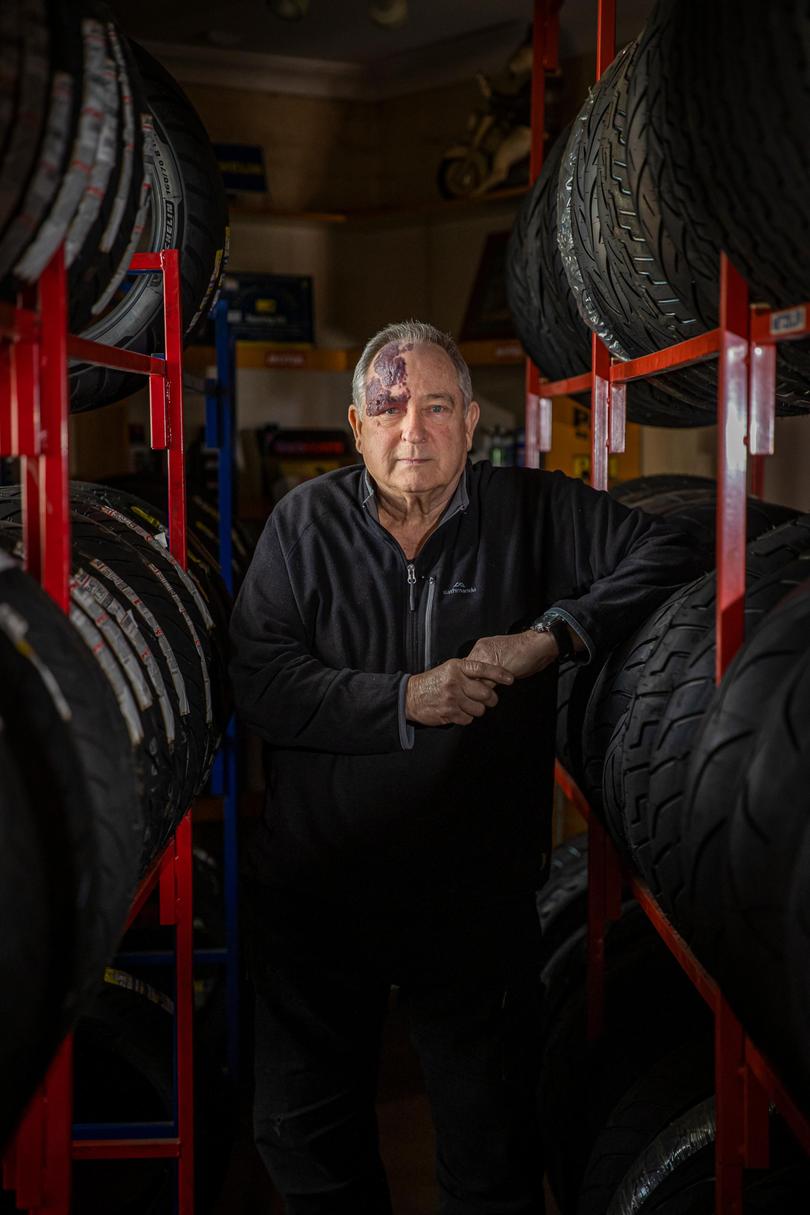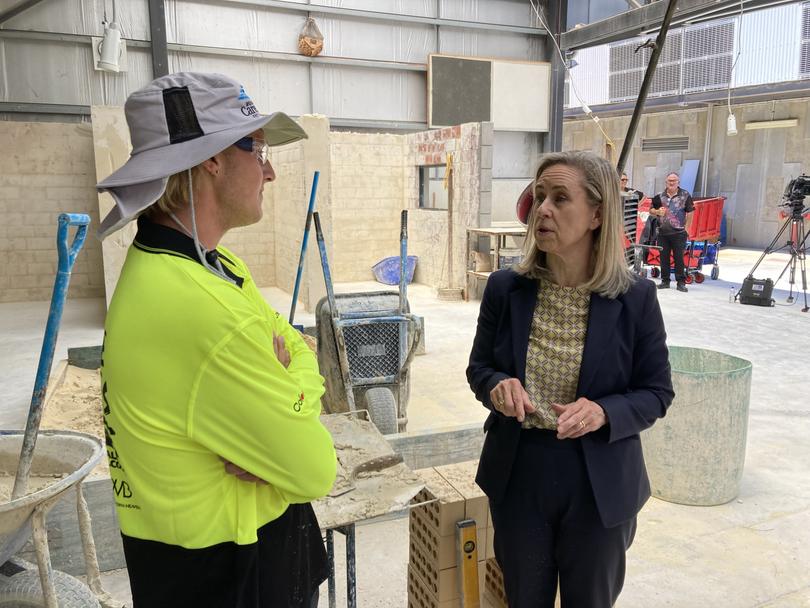WA mechanic says declining interest in trades among new ‘spoilt generation’ to blame amid labour crisis
A WA mechanic has blamed the ‘spoilt generation’ who only order ‘$50 burgers’ on Uber Eats for the closure of his business.

A WA mechanic has blamed the “spoilt generation” for the closure of his business, saying young people were dismissing apprenticeships because of low pay while ordering “$50 burgers” on Uber Eats.
After years of struggling to find apprentices Dave Rawson shut up his North Perth shop The Bike Doctor because he couldn’t find anyone to staff it.
“They’ve been spoilt by my generation. We’ve tried to give our kids a better life than we had. We haven’t let them tough it out and make their own mistakes,” he said.
Sign up to The Nightly's newsletters.
Get the first look at the digital newspaper, curated daily stories and breaking headlines delivered to your inbox.
By continuing you agree to our Terms and Privacy Policy.“A lot of young people say they don’t have money but if you have a look at their bank statements and they pay $50 to get a hamburger delivered and all this sort of stuff. That’s where your money’s going.
“You just can’t save money when you blow it like that.”

Across four decades in business, Mr Rawson estimated he’s had just a dozen apprentices.
He said while some had lasted years, others had lasted weeks and none had had the appetite to remain in the sector.
“Once they get the job, they’re as happy as Larry. But within three to six months, they’re dragging their lip around the workshop. Some people expect too much,” he said.
He said that money appears to be the key factor driving the lack of interest — but the problems started with schooling and then compounded by the thriving mining sector.
“It’s a multifaceted problem. It just breaks my heart. Part of the problem is our education system doesn’t promote trades as an alternative for kids leaving school,” Mr Rawson said.
“They’re all encouraged to go to university. But they come out with $100,000 of debt, a piece of paper, no job, and no experience.
“Mining is a very attractive job for young people, because they can go straight into the big bucks. Our industry has always suffered from having a problem getting good people in the workshop.”
But what do those on the receiving end of Mr Rawson’s wrath think?
Kiara Derschow, 22, said she had previously considered a meat processing trade but was put off by horror stories from friends who undertook apprenticeships.
From bullying and poor treatment by bosses to underpayment and unsustainable wages, she said she opted to stay working in retail.
Bianca Russell, 22, echoed her concerns and hit back it was a generational problem.
“You can’t live off that. If they complain about not having enough money, it’s because they get like $14 an hour,” Ms Russell said.
“Another one of my mates who was an apprentice, he got treated severely by his boss. It really turned me off going into an apprenticeship.”
Ms Derschow also hit back at criticisms of how generation Z spent their money, saying it was unhelpful.
She also suggested that a lot of young people might prioritise short-term gratification over saving for a house because the Great Australian Dream seemed out-of-reach regardless of how savvy they were with their money.
“It’s always been a thing you hear that ‘kids don’t want to work these days’ but it’s not true. We do and we actually have to do a lot more work to get ahead,” Ms Derschow said.
“And it isn’t really your business what people spend their money on.”

For heavy diesel mechanic apprentice Connor Gale, 21, while he has found passion in his trade, he agreed it was common for young people in his sector to drop out before they finish training.
He blamed the cost-of-living crisis and the reality that there are a growing number of options to make a good wage faster.
“The customer service advisers make more than the mechanics on bonuses. So, the way they look at it is , why would you sacrifice four years on crap pay when you could go straight into a service adviser role,” Mr Gale said.
“Also, everything’s increasing but your pay stays the same. My other mate who is a mechanic, he’s 27 and battling to pay rent and just living costs because he’s on $700 a week.”
But it’s not just pay putting youngsters off.
School nurse Daisee Johnston, 23, and student personal trainer Kristen De Florencas, 24, say they didn’t consider apprentices because of stereotypes that trades were for men.
They also suggested, anecdotally, that gen Z’s weren’t driven by money and were in fact turning away from traditional apprenticeships due to increasing expectations around work-life balance, flexibility and autonomy.
“We want to make a difference and help people as much as we can and the money will sort itself out,” Ms De Florencas said.

Ms Johnston said people were increasingly seeking out careers that align to their values, which they perceived as meaningful work that contributed to something larger than themselves.
“There were still stereotypes about it being a man’s job. I think that’s what I was brought up with,” she said.
“But I feel like our generation is very different minded. I’ve always wanted to help people. So, I don’t actually care at the end of the day.”
But the lack of interest isn’t just anecdotal.

Motor Trade Association of WA chief executive Stephen Moir said the State’s motor industry was facing a significant shortage of 3500 skilled tradespeople. Nationally, there were 35,000 technician gaps to fill.
“It’s disappointing that the construction industry gets all the focus. They say, ‘we can’t build houses’, well we might not be able to fix cars pretty soon if we keep going,” Mr Moir said.
He added that the COVID pandemic had prompted the “great resignation”, leaving behind an ageing demographic of business owners.
“Most business owners in the automotive industry are above 50,” Mr Moir said.
“A lot of those people are saying, ‘you know what, I can’t get staff, I can’t cope with all the work, and there’s so much work out there’ so they’re just shutting up shop, which is a bit of a worry.”
While the motor industry might be struggling to fill roles WA Training Minister Simone McGurk said West Aussies were taking up other apprenticeships and traineeships in “record levels”.
“Apprenticeships are currently more than seventy percent higher compared to at the start of the pandemic,” she said.
“WA also hit a new record of over 153,800 publicly-funded vocational course enrolments in 2023 — driven largely by our government’s strong investment in TAFEs and through our initiatives like fee-free and low-fee training.
“But we’re not taking it for granted. We know businesses want workers, and we’re doing absolutely everything we can to attract more trainees and apprentices into training – so we can get more boots on the ground.”

The construction and electrical sectors have seen significant growth in apprenticeship commencements, with increases of 8.3 per cent, 3.1 per cent respectively.
Ms McGurk said there was a range of free and practical support to assist employers having difficulty attracting and retaining apprentices.
And she disagreed with Mr Rawson, who believed parents and teachers were increasing pressuring children to become doctors, lawyers, or accountants.
“The perception of TAFE and training is changing — it’s no longer considered a Plan B to university,” Ms McGurk said.

“Apprentices can ‘earn while they learn’ and go on to get secure, well-paying jobs in a range of industries, without being saddled with a HECS debt.
“There has never been a better time to get into training.”
